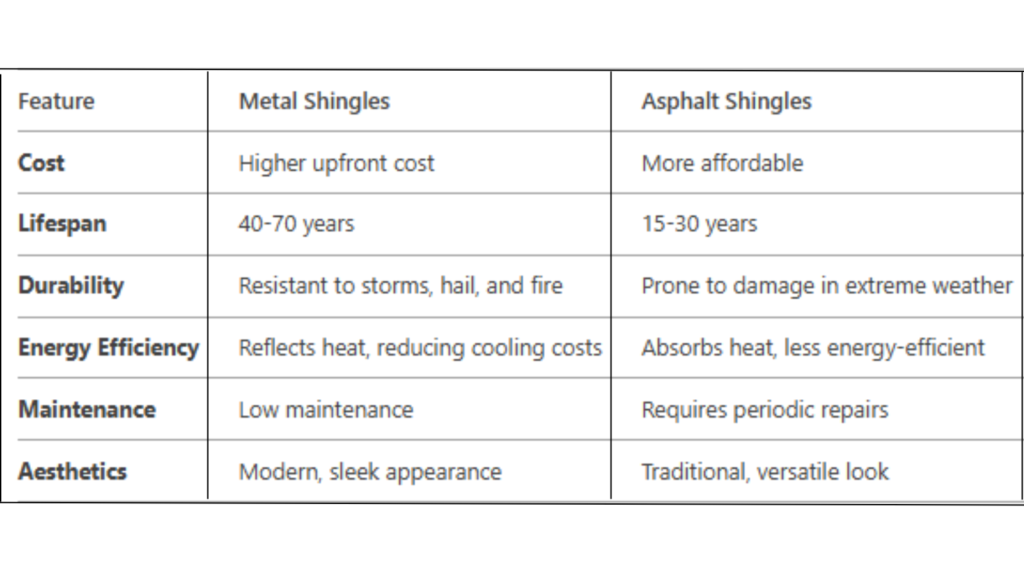When it comes to roof replacement, homeowners often find themselves torn between metal and asphalt shingles. Both options have their pros and cons, and the right choice depends on factors like climate, budget, and long-term goals. In this blog, we’ll break down the differences between metal and asphalt shingles, explore their performance in Texas weather, and help you decide which roofing material is best for your home. Whether you’re looking for roof repair service, roof replacement service, or simply want to learn more, this guide has you covered.
What Are Metal and Asphalt Shingles?
Before diving into the comparison, let’s define the two materials:
- Metal Shingles: Made from materials like steel, aluminum, or copper, metal shingles are durable, lightweight, and designed to mimic the appearance of traditional shingles. They are known for their longevity and energy efficiency.
- Asphalt Shingles: The most common roofing material in the U.S., asphalt shingles are made from a fiberglass base coated with asphalt and mineral granules. They are affordable, easy to install, and come in a variety of styles and colors.
What Are the Key Differences Between Metal and Asphalt Shingles?
Here’s a quick comparison of the two materials:

Is It Better to Get a Metal Roof or Asphalt Shingles in Texas?
Texas is known for its harsh weather, including intense heat, heavy rain, and occasional hailstorms. When choosing between metal and asphalt shingles, consider the following:
- Metal Roofs: Ideal for Texas heat, metal roofs reflect sunlight and keep your home cooler. They also withstand high winds and hail, making them a durable choice for Fulshear’s climate.
- Asphalt Shingles: While more affordable, asphalt shingles can deteriorate faster under extreme heat and UV exposure. However, they are a popular choice for homeowners on a budget.
Which Roof Type Lasts Longer in Fulshear’s Climate?
Fulshear’s climate can be tough on roofs, with scorching summers and occasional storms. Here’s how the two materials stack up:
- Metal Roofs: With a lifespan of 40-70 years, metal roofs are built to last. They resist fading, cracking, and warping, even in extreme heat.
- Asphalt Shingles: Typically lasting 15-30 years, asphalt shingles may require more frequent replacements in Fulshear’s climate due to heat and storm damage.
If you’re looking for a long-term solution, metal roofs are the clear winner. For those planning to move or upgrade in the near future, asphalt shingles may suffice.
Do Metal Roofs Lower Energy Bills in Hot Climates?
Yes! Metal roofs are highly energy-efficient, especially in hot climates like Fulshear, TX. They reflect solar radiant heat, reducing the amount of heat transferred into your home. According to the Metal Roofing Alliance, homeowners can save up to 25% on cooling costs with a metal roof.
Asphalt shingles, on the other hand, absorb heat, which can increase indoor temperatures and lead to higher energy bills. If energy efficiency is a priority, metal roofs are the better choice.
Will a Metal Roof Increase My Home’s Value in Fulshear, TX?
Absolutely. Metal roofs are considered a premium roofing option and can significantly boost your home’s resale value. According to Remodeling Magazine’s Cost vs. Value Report, homeowners can recoup up to 60% of the cost of a metal roof upon selling their home.
Additionally, metal roofs are attractive to buyers due to their durability, energy efficiency, and low maintenance requirements. If you’re planning to sell your home in the future, investing in a metal roof can pay off.
Are Metal Roofs Noisy During Rainstorms?
A common misconception is that metal roofs are noisy during rainstorms. However, modern metal roofs are installed with solid sheathing and insulation, which dampens sound. In fact, many homeowners find metal roofs to be no noisier than asphalt shingles during rain.
Which Roof Type Offers Better Protection Against Storms and Hail in Texas?
Texas is no stranger to severe weather, including hailstorms and high winds. Here’s how the two materials compare:
- Metal Roofs: Metal roofs are highly resistant to hail and wind damage. They can withstand winds of up to 140 mph, making them an excellent choice for storm-prone areas like Fulshear.
- Asphalt Shingles: While some asphalt shingles are rated for high winds, they are more susceptible to damage from hail and debris. Frequent storms can shorten their lifespan.
For maximum protection, metal roofs are the superior option.
What Is the Best Roofing Option for Texas Heat?
Texas heat can take a toll on roofing materials. Here’s how metal and asphalt shingles perform:
- Metal Roofs: Reflective coatings on metal roofs help deflect sunlight, keeping your home cooler and reducing energy costs. They are also less likely to crack or warp under prolonged heat exposure.
- Asphalt Shingles: Asphalt shingles absorb heat, which can lead to higher indoor temperatures and increased wear and tear over time.
If you’re looking for a roofing material that can handle Texas heat, metal roofs are the way to go.
Conclusion
Choosing between metal and asphalt shingles for your roof replacement in Fulshear, TX, depends on your budget, climate, and long-term goals. Metal roofs offer superior durability, energy efficiency, and storm protection, making them an excellent investment for Texas homeowners. On the other hand, asphalt shingles are a cost-effective option for those with shorter-term needs.
If you’re ready to explore your options, contact Surface Roofing for expert roof repair service Fulshear TX, roof replacement service, and roof insurance service. We also offer gutter service Fulshear TX to ensure your home is fully protected. With our experienced team and commitment to quality, we’ll help you choose the best roofing solution for your home.







